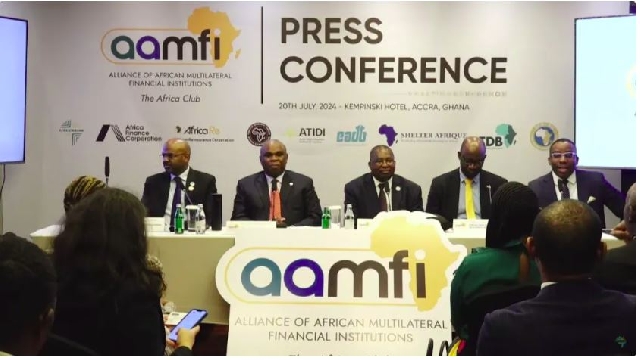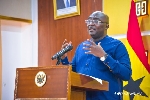The “Africa Club” initiative will be transformative for Africa - Prof Oramah
 Governing council of the Alliance of African Multilateral Financial Institutions
Governing council of the Alliance of African Multilateral Financial Institutions
The chairperson of the governing council of the Alliance of African Multilateral Financial Institutions, (AAMFI), Prof Benedict Oramah has said the formation of the alliance underscores Africa’s commitment to self-reliance and sustainable economic development, leveraging home-grown solutions and resources for the continent’s advancement.
“It [AAMFI] is a critical initiative that will be transformative for the continent, ensuring the effective mobilisation of our domestic resources, as well as international resources towards the continent’s development,” Prof Oramah said.
Prof Oramah who is also the president and chairman of the board of directors of Afreximbank was speaking at the introductory press conference of the AAMFI also known as the Africa Club in Accra on Saturday (20 July).
He said with the formation of the alliance, Africa recognises that “there is strength in unity and although we are separate and independent institutions, collectively, we have one purpose to improve the economic conditions of Africa and restore the dignity of all Africans”.
Albert Muchanga, the commissioner for trade and industry of the African Union Commission, said the AU recognises that to develop the continent there must be a conscious effort at broadening and deepening collaboration.
He said the AU has been very receptive to the approaches made by the members of the AAMFI adding that the continental body sees the alliance “as a vital liver in the development of an African capital market”.
Muchanga said for this AAMFI to benefit every African “it really needs to be made strong, collectively and individually beyond the disbursement of funding it’s also a source of very vital ideas”
He urged the members of the alliance to come up with evidence-based proposals that the Africa Union can advance in the G20 to reform the global financial architecture.
“Everybody agrees that the institutions of the global financial architecture that exist were created in an era which is no more. The number of sovereign states around the world has increased hence there’s a need among others to ensure that there is visible presence of executives from the developing world in the multilateral development banks around the round,” he said.
“We are committed to the development of Africa Union financial institutions and financial institutions across Africa. So, we see the alliance as our formidable partner in progress, we are going move together and generate resources together,” Muchanga added.
The Alliance of African Multilateral Financial Institutions, (AAMFI) also known as the Africa Club is a coming together of African multilateral financial institutions, set up by treaty, by African states in response to the inadequacies of the global and continental financial architecture.
The Africa Club was launched in collaboration with the African Union Commission, by African heads of state, on the margins of the 37th Ordinary Session of the Assembly of the Heads of State and Government of the African Union on 17 February 2024 in Addis Ababa, Etiopia.
The Africa Club aims to collaborate to address the continent’s development finance needs and promote the interests of member states.
It is also to advocate for Africa on global finance issues, develop innovative finance tools, support sustainable finance strategies and coordinate debt management negotiations.
AAMFI’s membership includes Africa Finance Corporation (AFC), African Export-Import Bank (Afreximbank), Trade and Development Bank Group (TDB Group), African Reinsurance Corporation (Africa Re), African Trade and Investment Development Insurance (ATIDI), Shelter Afrique Development Bank (SHAFDB), ZEP-RE (PTA Reinsurance Co.), African Solidarity Fund (ASF) and East African Development Bank (EADB).
These institutions have a collective balance sheet of over US$62 billion deployed specifically to address and meet the critical trade and investment gaps across the continent.
Trending News

24-hour economy’ll ruin businesses like Abossey Okai; even God who created the world sleeps at night – Napo
12:26
VRA workers oppose proposed merger with Bui Power Authority
03:44
Recall of Parliament an ‘act in bad faith’ – Bagbin
17:20
Dec. 7 polls: Bawumia calls for peace, promises reforms on tour of Greater Accra
12:34
PNC postpones nat’l delegates congress again, sets new date for Sept. 7
22:53
Atta Kyea defends President Akuffo Addo on failed galamsey fight
10:07
Greater Accra NPP Chairman confident of winning nine additional seats
03:33
O'Reilly SHS student arrested for stabbing classmate to death
17:01
Grain smuggling does not warrant military deployment – Col Aboagye
15:37
Ghana signs milestone nuclear cooperation agreement with U.S. at US-Africa Summit
12:51



